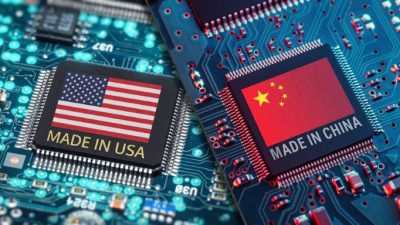US Economic War on China Threatens Global Microchip Industry

All Global Research articles can be read in 51 languages by activating the Translate Website button below the author’s name.
To receive Global Research’s Daily Newsletter (selected articles), click here.
Follow us on Instagram and Twitter and subscribe to our Telegram Channel. Feel free to repost and share widely Global Research articles.
***
Ever since China emerged as an economic powerhouse in recent decades, the political West (particularly the United States) has been trying to curb its growth and development. With the world’s largest workforce and by far the most important production economy, China wields enormous power to affect economic trends on a planetary level.
However, just like any other country, it’s still part of a globalized system which is essentially a network of interdependent economies. This has resulted in accelerated growth around the world, but it also created the risk of economic butterfly effects, as what may seem like a mere hiccup in one industry could cause a ripple that has the potential of turning into a tsunami of economic problems. It seems this is precisely the direction we are headed to, as the US is targeting China’s microchip industry.
On October 7, US President Joe Biden announced additional restrictions on American companies selling semiconductors to China. The move also includes restrictions on US citizens working for Chinese microchip manufacturers. Given the importance of these technologies in our era, such actions can only be seen as a declaration of full-blown economic war.
The US clearly hopes this will either severely slow down or even halt China’s rise as a technological superpower. According to Bloomberg, the country’s Ministry of Industry and Information Technology (MIIT) is already working with top microchip producers and is devising a joint plan of action to evaluate the damage and find solutions to maintain production. CEOs of major Chinese companies working in the sector have held a series of emergency meetings with the MIIT, including the executives from Yangtze Memory Technologies and Dawning Information Industry.
Western media claim that the Biden administration’s strategy to “paralyze China’s industrial capacity could be promising.” Allegedly, unnamed sources “familiar with the closed-door discussions between MIIT and CEOs of China’s top microchip manufacturers” claim there is “a lot of uncertainty on how to move forward.” For now, there had been no mention of possible countermeasures, as MIIT is said to believe there are no shortages and that domestic microchip needs will be met. The discussions supposedly revealed that some Chinese companies fear the US restrictions could harm the country’s plans to accelerate the development and production of its own advanced microchips, which could negatively affect China’s economic growth and in turn the global markets as well.
It appears that some companies are already in danger of directly being affected by the restrictions. Shanghai-based Biren Technology, specializing in artificial intelligence (AI), graphics rendering, high-performance general-purpose computing and other relevant services, initially planned to release a new graphics processing unit (GPU) and also “set a new record in global computing power.” However, as the company contracted the Taiwan Semiconductor Manufacturing Company (TSMC) to produce its microchips using advanced 7-nanometer technology, there’s a risk that TSMC may halt the project due to US restrictions. At the moment, Biren Technology has no capacity to manufacture advanced GPUs on its own, which also endangers the company’s other projects.
Last week, US personnel pulled out of China’s Yangtze Memory Technologies, while Netherlands-based ASML Holding NV stopped shipments for Chinese microchip companies. Recent reports also indicate that Dawning Information, the country’s top supercomputers manufacturer, is trying to find alternatives to US-designed microchips. Rhodium Group China expert Jordan Schneider claims that the Biden administration’s restrictions are a “massive blow to CCP’s science and technology ambitions.” He also stated:
“Long story short, every advanced node semiconductor company is currently facing comprehensive supply cut-off, resignations from all American staff, and immediate operations paralysis. This is what annihilation looks like: China’s semiconductor manufacturing industry was reduced to zero overnight. Complete collapse. No chance of survival.”
Naturally, such doom-and-gloom statements should be taken with a grain of salt, as many Chinese corporations, such as Huawei, have already experienced US sanctions in previous years. Although these companies have suffered damage as a result of such actions, they managed to find alternatives and continued operating even under new conditions of a complete lack of access to US technologies. Still, the sanctions affected certain companies only, while the most recent restrictions are nationwide and are affecting all China-based manufacturers.
Advanced microchips are used in virtually every sector of any country’s production economy and China is certainly no exception. The Biden administration’s restrictions are most likely aimed not just against China’s economic growth, but also its rise as a military superpower, as fighter jets, missiles, drones and many other types of weapons require microchips. In addition, China’s recent dominance in AI research and development could also be in jeopardy.
Still, Beijing is certainly not without options and is yet to respond to America’s escalating belligerence. The US already proved to be vulnerable to counter-sanctions, as evidenced by the presence of key Chinese components in US weapons, including F-35 fighter jets.
*
Note to readers: Please click the share buttons above. Follow us on Instagram and Twitter and subscribe to our Telegram Channel. Feel free to repost and share widely Global Research articles.
Drago Bosnic is an independent geopolitical and military analyst.
Featured image is from InfoBrics

